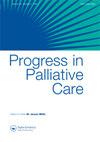预先的护理计划是否会影响亲属寻求医疗保健的行为?
IF 0.8
Q4 PUBLIC, ENVIRONMENTAL & OCCUPATIONAL HEALTH
引用次数: 0
摘要
背景绝症患者的亲属最常经历痛苦。已经制定了预先护理计划(ACP),以计划临终关怀和支持患者及其亲属。ACP已被证明对绝症患者的亲属有积极影响,并可能影响他们寻求医疗保健的行为。该研究的目的是调查ACP与亲属与全科医生的接触和住院之间的关系。方法在先前随机对照试验的基础上,我们进行了一项前瞻性纵向研究。以前被随机分配到一个ACP谈话或对照组的患者亲属也包括在内。有关亲属的全科医生和医院联系人的信息是通过医疗保健登记处使用个人民事登记号码获得的。在两个时间窗口内分析了全科医生和医院接触者的内容、分布和中位数:护理期(从随机化到失去)和丧亲期(从失去到六个月后)。结果两组全科医生或医院接触者的中位数无显著差异。然而,在护理期间,我们发现全科医生接触者的分布存在显著差异(p = 0.022);对照组中更多的亲属与他们的全科医生没有接触。结论既往ACP谈话不会影响亲属中全科医生或医院接触者的中位数,但在护理期间,ACP组中有更多的亲属至少有一次全科医生接触。该研究强调了进行ACP试验的重要性,其结果与亲属和患者有关。本文章由计算机程序翻译,如有差异,请以英文原文为准。
Does advance care planning affect relatives’ healthcare-seeking behaviour?
Background Relatives of terminally ill patients most often experience distress. Advance Care Planning (ACP) has been developed to plan end-of-life care and support patients and relatives. ACP has been shown to have a positive impact on relatives of terminally ill patients and may affect their healthcare-seeking behaviour. The aim of the study was to investigate associations between ACP and relatives’ contacts with general practitioners (GPs) and hospital admissions. Methods Based on a prior randomized controlled trial we conducted a prospective longitudinal study. Relatives of patients formerly randomized into one ACP conversation or control group were included. Information regarding relatives’ GP and hospital contacts was achieved through healthcare registries using personal Civil Registration numbers. The content, distribution, and median number of GP and hospital contacts were analyzed in two time windows: the caregiving period (from randomization until loss) and the bereavement period (from loss until six months after). Results No significant difference in the median number of GP or hospital contacts between the two groups was found. However, in the caregiving period, we found a significant difference in the distribution of GP contacts (p = 0.022); More relatives in the control group had no contact with their GP. Conclusion The prior ACP conversation did not affect the median number of GP or hospital contacts among relatives, but statistically significantly more relatives in the ACP group had a least one GP contact in the caregiving period. The study emphasizes the importance of performing ACP trials with outcomes in relation to relatives and patients.
求助全文
通过发布文献求助,成功后即可免费获取论文全文。
去求助
来源期刊

PROGRESS IN PALLIATIVE CARE
PUBLIC, ENVIRONMENTAL & OCCUPATIONAL HEALTH-
CiteScore
2.60
自引率
11.80%
发文量
24
期刊介绍:
Progress in Palliative Care is a peer reviewed, multidisciplinary journal with an international perspective. It provides a central point of reference for all members of the palliative care community: medical consultants, nurses, hospital support teams, home care teams, hospice directors and administrators, pain centre staff, social workers, chaplains, counsellors, information staff, paramedical staff and self-help groups. The emphasis of the journal is on the rapid exchange of information amongst those working in palliative care. Progress in Palliative Care embraces all aspects of the management of the problems of end-stage disease.
 求助内容:
求助内容: 应助结果提醒方式:
应助结果提醒方式:


